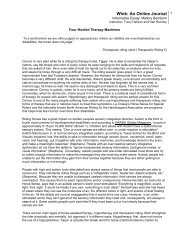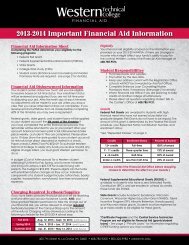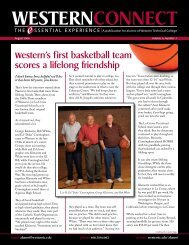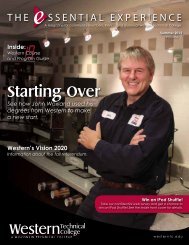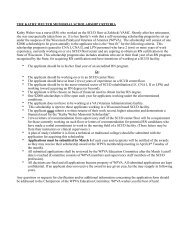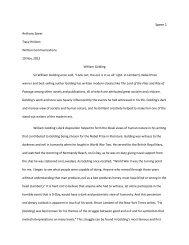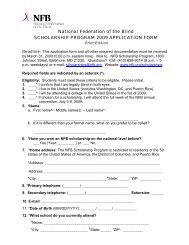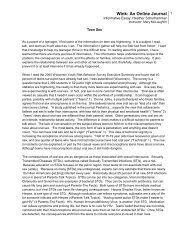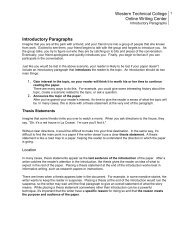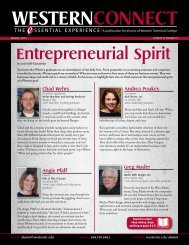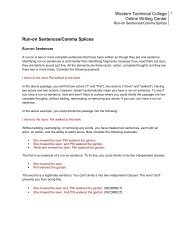The History of Western Technical College
The History of Western Technical College
The History of Western Technical College
You also want an ePaper? Increase the reach of your titles
YUMPU automatically turns print PDFs into web optimized ePapers that Google loves.
In the homemaking area many persons created beautiful items for their homes in the line <strong>of</strong> tailored slipcovers and<br />
accessories along with furniture that was refinished. Food preparation, nutrition, and supper clubs for preparing<br />
well-balanced meals were popular. <strong>The</strong>re was no end for producing charming articles to use around the home.<br />
<strong>The</strong> agriculture department took steps toward establishing it as a permanent part <strong>of</strong> the school instead <strong>of</strong> working as a<br />
temporary agency in training on-the-farm veterans under the G.I. Bill <strong>of</strong> Rights, and an agricultural advisory committee<br />
was appointed. In 1948, there were 50 men enrolled in this program.<br />
In March 1948, Marshall G. Batho <strong>of</strong> West Bend, Wisconsin, was appointed to succeed superintendent <strong>of</strong><br />
La Crosse Public Schools, Dr. R. W. Bardwell. In this position, Batho automatically served on the Vocational School<br />
Board.<br />
Board President Joseph G. Becker was honored at a joint education and vocational board banquet on Monday, January<br />
26, 1948. Becker who retired from the railroad was no longer eligible to serve in the employer category on the<br />
Vocational Board. Becker served on the Vocational Board from 1925 to 1948, and was succeeded on the Board by<br />
George Hall, AFL organizer. Also retiring from the Board was Dr. R. W. Bardwell, superintendent <strong>of</strong> schools, an<br />
ex-<strong>of</strong>ficio member.<br />
<strong>The</strong> 1948 Board members were R. H. Anderegg, president; Frank Papenfuss, vice president; Superintendent <strong>of</strong> Schools<br />
Marshall Batho, secretary; Raymond C. Bice, and George W. Hall.<br />
March 10-11, 1948 – the Vocational Board revived the former custom <strong>of</strong> holding an Open House for the citizens <strong>of</strong> La<br />
Crosse and neighboring communities. “<strong>The</strong> pressures <strong>of</strong> war-time schedules was the only reason for discontinuing this<br />
pleasant practice,” said Director Coleman. A large display <strong>of</strong> finished products, and visits to classrooms and shops were<br />
on the agenda.<br />
“Rehabilitation” -- A field that became more prominent in society, particularly after the war, was that <strong>of</strong> rehabilitation,<br />
not only <strong>of</strong> veterans who received service disabilities but also <strong>of</strong> civilians who had a physical handicap <strong>of</strong> one nature or<br />
another. A typical example <strong>of</strong> this was a 19-year-old youth from Lancaster, Wisconsin, who, though unable to use the<br />
fingers <strong>of</strong> his left hand, learned the typewriting system for one hand and mastered the touch system without looking at<br />
the keys. <strong>The</strong> method, which uses a blank keyboard and special metal “caps” was devised by Marie H. Peterson, teacher<br />
in the <strong>College</strong> <strong>of</strong> Commerce school, and enabled her disabled pupils to type one-handed.<br />
A veteran teaches a veteran. This was the case in 1948 for two men from Westby. <strong>The</strong> teacher, Wesley Ballsrud,<br />
instructed Orville Melby, a disabled veteran, who was wounded in the Philippines, in the intricacies <strong>of</strong> accounting.<br />
On November 17-18, 1948, about 50 Rural Electrification Association (REA) <strong>of</strong>fice managers and bookkeepers attended a<br />
training conference for the purpose <strong>of</strong> improving <strong>of</strong>fice efficiency and management. Speakers and their subjects were<br />
Marie H. Peterson, <strong>College</strong> <strong>of</strong> Commerce “Everlasting Your Telephone Technique;” Norman Mitby, assistant director <strong>of</strong><br />
the Vocational School (and later director <strong>of</strong> the Madison Vocational School) the “Importance and Technique <strong>of</strong> Job<br />
Analysis;” and other topics that were directly associated with the REA.<br />
It’s Christmas time again, and every year around Christmas time, the North Pole moves down to the Vocational School<br />
and several rooms were transformed into a toyshop. It’s the annual Jaycees Christmas toy collection and Jaycette<br />
Christmas doll projects for needy children.<br />
1948 Auditorium events included . . .<br />
February 1 <strong>The</strong> La Crosse Vocational Civic Band presented its popular “Pops” concert <strong>of</strong> familiar music, directed by<br />
Frank Italiano. <strong>The</strong> band, 75 strong, gave the first public concert to commemorate the Wisconsin<br />
Centennial in La Crosse. Bandleaders and players from eight neighboring communities participated.<br />
Two guest conductors appeared with the band: Whitney Nichols, a band organizer <strong>of</strong> many<br />
neighboring and local bands, and Edgar G. Doudna, <strong>of</strong> the state board <strong>of</strong> teachers college regents and<br />
an early Wisconsin band director at Richland Center. Doudna conducted “Ruby Red,” a march that<br />
he had first taught his Richland Center band 40 years ago, and Nichols conducted a march, “Greetings<br />
to Bangor” by R. B. Hall and dedicated it to the neighboring village <strong>of</strong> Bangor.





